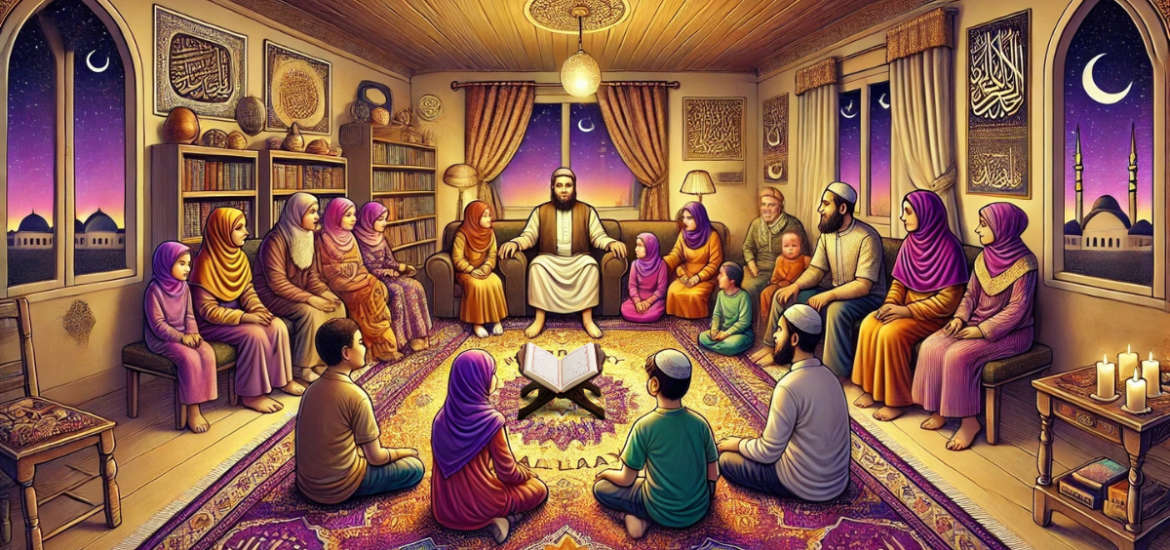Teaching the Six Pillars of Iman to children is an opportunity to nurture their faith and shape their understanding of Islam in an enjoyable and engaging way. These fundamental aspects of belief form the backbone of a Muslim’s life, guiding actions, thoughts, and morals. By introducing creative, age-appropriate methods, parents and educators can make this learning process a meaningful journey filled with excitement and discovery.
What Are the Six Pillars of Faith?
The Six Pillars of Iman are the core beliefs that every Muslim must uphold, collectively known as the six pillars of faith. They are:
-
- Belief in Allah: Trusting in Allah’s existence and oneness, acknowledging Him as the creator beyond human comprehension, time, and space.
- Belief in Angels: Accepting that angels are Allah’s messengers and servants.
- Belief in the Books of Allah: Believing in the divine scriptures sent to guide humanity, including the Quran, Torah, and Gospel.
- Belief in the Messengers: Acknowledging all the prophets, such as Prophet Musa, Prophet Isa, and Prophet Muhammad (PBUH).
- Belief in the Day of Judgment: Accepting that all humans will be held accountable for their deeds.
- Belief in Divine Decree: Trusting in Allah’s ultimate plan, both the good and the challenges.
These beliefs are beautifully summarized in Surah Al-Baqarah (2:285): “The Messenger believes in what has been revealed to him from his Lord, and [so do] the believers. All of them have believed in Allah and His angels and His books and His messengers…”
Explore more about Islamic teachings and faith-building activities at Islamic Galaxy.
Detailed Explanation of Each Pillar
The First Pillar: Belief in One and Only God (Tawhid)
The first pillar of faith in Islam is the belief in one and only God, known as Tawhid. This fundamental concept emphasizes the absolute oneness of Allah, who is the creator, sustainer, and ruler of the universe. Muslims believe that Allah is the only deity worthy of worship, with no partners or equals. The Quran repeatedly emphasizes the uniqueness of Allah, stating, “Say, ‘He is Allah, [who is] One, Allah, the Eternal Refuge. He neither begets nor is born, nor is there to Him any equivalent’” (Surah Al-Ikhlas, 112).
Tawhid is the foundation of Islamic faith, and it is the first declaration of the Shahada, the Islamic creed. Muslims believe that Allah’s existence is beyond human comprehension, and that He is the sole creator of the universe and all its contents. The concept of Tawhid is essential in Islam, as it distinguishes the faith from polytheistic and idolatrous beliefs.
The Second Pillar: Belief in the Angels (Mala’ika)
The second pillar of faith in Islam is the belief in the angels, known as Mala’ika. Angels are considered divine beings created by Allah to carry out His commands and record the deeds of humans. Muslims believe that angels are created from light and are tasked with various duties, such as delivering divine messages, recording human deeds, and serving as guardians.
The Quran mentions several angels, including Jibreel (Gabriel), Mikail, Israfeel, and Malik. Muslims believe that angels are in complete submission to Allah and are not capable of disobeying His commands. The belief in angels is essential in Islam, as it emphasizes the idea that Allah is not alone in the universe and that He has created beings to serve Him and carry out His will.
The Third Pillar: Belief in the Revealed Scriptures (Kutub)
The third pillar of faith in Islam is the belief in the revealed scriptures, known as Kutub. Muslims believe that Allah has revealed scriptures to His messengers throughout history, including the Quran, Torah, Psalms, Gospel, and others. The Quran is considered the final and supreme scripture for all of humanity, and it is believed to be the word of Allah as revealed to Prophet Muhammad.
Muslims believe that the scriptures contain guidance and wisdom for humanity, and that they are a source of comfort and solace for believers. The Quran emphasizes the importance of believing in the scriptures, stating, “And this is a Book which We have sent down, blessed and confirming what was before it, that you may warn the Mother of Cities and those around it” (Surah Al-An’am, 92).
The Fourth Pillar: Belief in the Messengers (Anbiya)
The fourth pillar of faith in Islam is the belief in the messengers, known as Anbiya. Muslims believe that Allah has sent messengers throughout history to guide humanity and deliver His message. The Quran mentions 25 prophets by name, including Noah, Abraham, Moses, Jesus, and Muhammad.
Muslims believe that all the messengers were sent with the same message of monotheism and that they were tasked with guiding their respective nations. The Quran emphasizes the importance of believing in the messengers, stating, “The Messenger believes in what has been revealed to him from his Lord, and [so do] the believers. All of them believe in Allah and His angels and His books and His messengers” (Surah Al-Baqarah, 285).
The Fifth Pillar: Belief in the Last Day (Qiyamah)
The fifth pillar of faith in Islam is the belief in the Last Day, known as Qiyamah. Muslims believe that the Last Day is the day of judgment, when all humans will be held accountable for their deeds. The Quran emphasizes the importance of believing in the Last Day, stating, “And they who give what they give while their hearts are fearful because they are about to return to their Lord” (Surah Al-Mu’minun, 60).
Muslims believe that the Last Day is a day of reckoning, when all humans will be judged based on their deeds. The Quran describes the Last Day as a day of great terror and fear, but also as a day of great reward for those who have lived righteous lives. The belief in the Last Day is essential in Islam, as it serves as a reminder to believers to live virtuous lives and to be mindful of their deeds.
Why Make Learning the Pillars of Iman Fun?
Strengthening a Child’s Faith
Engaging methods make the Six Pillars relatable and easy to understand. This strengthens a child’s faith and helps them appreciate the beauty of a Muslim’s faith, including the Five Pillars of Islam and the Six Pillars of Iman.
Building a Connection to Daily Life
By tying these beliefs to everyday actions and stories, children can see how faith influences daily decisions, fostering a natural connection to Islam.
Creative Ways to Teach the Six Pillars of Iman
1. Interactive Games for Learning
Games are a fantastic way to make abstract concepts tangible for kids.
-
- Belief in Allah: Create a “Tawheed Puzzle” where children match Allah’s attributes (e.g., Merciful, All-Knowing) with their meanings.
-
- Belief in Angels: Play “Angel Charades,” where kids act out roles of angels like Angel Jibreel or Angel Israfil.
-
- Belief in Books: Use flashcards to quiz kids on which prophet received which book.
-
- Belief in Messengers: Host a “Prophet Trivia” session where kids guess prophets based on clues.
-
- Belief in the Day of Judgment: Introduce a “Deeds Chart” where kids track their good and bad deeds daily, emphasizing the importance of good deeds and their consequences in the afterlife.
-
- Belief in Divine Decree: Play “Allah’s Plan Spinner,” where kids spin a wheel to learn about events and how to trust Allah’s wisdom.
Find similar interactive games and resources, as well as online resources for kids.
Storytelling and Narratives about Prophet Muhammad
Stories are a powerful tool to convey moral lessons and Islamic values.
-
- The Prophets’ Stories: Share the inspiring tales of Prophet Musa crossing the sea or Prophet Isa healing the sick by Allah’s will.
-
- Stories of Angels: Narrate how Angel Jibreel revealed the Quran to Prophet Muhammad (PBUH).
-
- Relating to Kids’ Lives: Use analogies, like comparing belief in the Day of Judgment to grading a test—where Allah is the ultimate teacher and human beings are accountable for their actions, just as students are responsible for their performance.
Encourage children to engage with Islamic literature and resources. Discover more at Islamic Galaxy.
3. Arts, Crafts, and Visual Learning
Art projects can make faith lessons visually memorable.
- Belief in Allah: Create a “Tawheed Tree” where each branch represents Allah’s attributes.
- Belief in Angels: Kids can make angel figures using construction paper and googly eyes.
- Belief in Books: Design miniature versions of holy books like the Quran.
- Belief in Divine Decree: Create a “Wheel of Qadr” showing events that emphasize trusting Allah.
4. Role-Playing and Daily Life Scenarios
Role-playing can turn Islamic lessons into a hands-on experience.
-
- Daily Prayers: Encourage kids to act as Imams leading a family prayer.
-
- Charity Drives: Role-play donating to the needy as an example of preparing for the Day of Judgment.
-
- Respect for Prophets: Act out moments from the lives of Prophet Muhammad (PBUH) or Prophet Dawud.
-
- Divine Decree: Create scenarios where children learn about how all events unfold according to what allah decrees, emphasizing the importance of accepting Allah’s wisdom in His decrees.
Connecting Faith to Nature, Science, and Allah’s Existence
Help children see Allah’s creation in the world around them.
-
- Explore Allah’s Creations: Take nature walks to observe plants, animals, and the sky, tying it back to Allah’s power and the belief in only one god.
-
- Fun Science Experiments: Conduct experiments to explain the balance of the universe as part of Allah’s divine decree.
Practical Tips for Parents
Be Consistent
Repetition reinforces understanding. Make discussions about the Six Pillars a regular part of daily routines, like bedtime stories or mealtime talks.
Use Technology Wisely
Introduce educational apps, videos, and games that focus on Islamic teachings. Platforms like Islamic Galaxy offer safe and engaging tools for young Muslims.
Conclusion: A Lifelong Journey of Faith
Teaching the Six Pillars of Iman to children isn’t just about memorizing facts—it’s about fostering a lifelong connection to Allah. By incorporating the teachings of the Prophets, such as the messages conveyed by ‘O prophet’ in the Quran, you can help your children embrace faith as a natural and joyful part of their lives.




